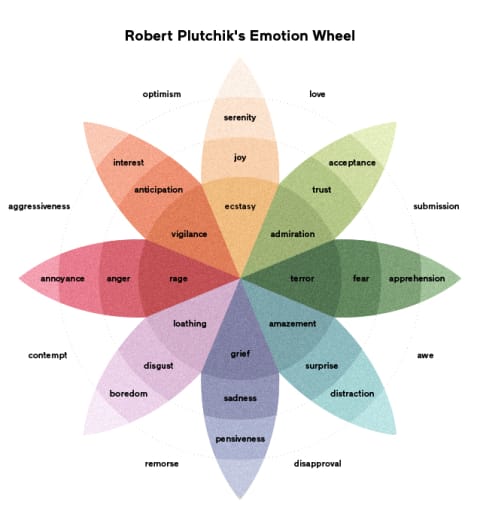Advertisement
What Emotion Am I? A Quiz To Find Your Dominant Emotion


We all experience emotions differently, and certain emotions may present more strongly depending on the person.
According to clinical psychologist Nicole Beurkens, Ph.D., CNS, an individual may have a tendency to move toward certain emotions more frequently, or they may more strongly identify with a specific emotion.
Whether it's joy, grief, anger, or fear, knowing which emotions are strongest in you can not only help you understand yourself more deeply—but also make changes if those emotions aren't serving you.
If you've been asking yourself, "what emotion am I?" Here's an emotions quiz to find out, plus how to work with your results.
What emotion am I? The human emotions quiz
This 15-question human emotions quiz was developed not to find out what mood you're in right now, but which emotion seems to be the primary driver behind your mindset and actions. Take your time reflecting on the questions, and be honest with your responses.
How many types of emotions are there?
Emotions are defined by the Oxford Dictionary as "a natural instinctive state of mind deriving from one's circumstances, mood, or relationships with others." Depending which psychological theory or research study you reference, there are anywhere from four to 34,000 emotions—and neither would really be wrong.
One 2019 study published in the journal Frontiers in Psychology1, for example, suggests there are four types of basic emotions: happiness, sadness, fear, and anger. But when we start to dig a little deeper, we understand that happiness can encompass everything from joy to curiosity to love, while fear can encompass everything from anxiousness to dread to panic.
Additional research has identified 27 main emotions, while another popular theory of emotions developed by psychologist Robert Plutchik, Ph.D., holds that humans have the capacity to experience over 34,000 unique emotions. Plutchik and other theorists have often depicted these various types of feelings as an emotion wheel, such as the one below:
That said, many of the more specific emotions we experience do tend to be a "sub-emotion," so to speak, of those aforementioned primary four emotions.

The 4 basic types of emotions
Happiness
Happiness includes everything from feeling joyful, inspired, creative, open, and so much more. As Beurkens tells mindbodygreen, there are, indeed, people who operate from a happy or otherwise content state of mind. "They live from a place of having more internalized joy and looking for the joy," she explains.
A few emotions that would fall under happiness include:
- Excited
- Vibrant
- Energetic
- Playful
- Amused
Sadness
According to Beurkens, sadness is often very misunderstood, and if you've ever heard the expression, "Depression is living in the past, anxiety is living in the future," this explains a lot. As Beurkens notes, "A lot of what people attribute to sadness in their life is actually more accurately labeled as grief. Depression tends to be grief, regret, guilt, resentment—which is all about stuff that's already happened."
Some emotions that would fall under sadness include:
- Lonely
- Ashamed
- Guilty
- Regret
- Apathetic
Fear
Just as sadness can be interpreted as living in the past, fear would be living in the future or namely, a negative anticipation of future events.
As Beurkens explains, "Some people absolutely identify with being afraid of everything, often on a very subconscious level. They don't realize that they've taken it on as their identity and that fear drives most of how they view the world and how they behave in it."
Some other emotions that fall under fear include:
- Anxious
- Insecure
- Embarrassed
- Helpless
- Apprehensive
Anger
Anger is defined as "a strong feeling of annoyance, displeasure, or hostility," and according to Beurkens, we can become angry so often that it begins to permeate our thought processes unconsciously. An angry person may get easily frustrated, hostile, or antagonistic, whereas a more peaceful person may be less emotionally reactive in that way.
Some other emotions that would fall under anger include:
- Hostile
- Enraged
- Disgusted
- Annoyed
- Hateful
Interpreting your results
If you're not pleased with your quiz results, the good news is, it doesn't have to be a forever thing. As Beurkens explains, "We may have a tendency towards [certain emotions], but those are modifiable—we can do work to shift those driving emotions, which is the fun and hopeful part," adding that the more we're able to live in the here and now, "the better adjusted we tend to be, and the better regulated we are around our emotions."
Regardless of your quiz results, Beurkens makes it clear that it's normal and healthy to experience the full range of human emotions, and we shouldn't try to avoid them—even the negative ones. "The goal is to be able to regulate these emotions for ourselves, to not stay stuck in them," she says, noting that even staying in the realm of only positive emotions can lead to emotional suppression.
Frequently Asked Questions
What is the 90-second rule for emotions?
Research from Harvard-trained neuroscientist Jill Bolte-Taylor, Ph.D., suggests we only actually feel emotions for 90 seconds, and anything after that is an emotional loop we're stuck in.
What are the four types of feelings?
A vast majority of the emotions we experience can be broken down into four primary categories: happiness, sadness, fear, and anger.
What is the hardest emotion to control?
According to Beurkens, shame is often the hardest emotion to control because it is deeply woven into our psyche and involves a great deal of emotional unpacking.
The takeaway
Emotions are an inherent part of the human experience, and even the emotions we tend to label as "negative" deserve their own recognition and compassion.
No matter your quiz results, what counts is how well you're able to integrate (and regulate) the emotions you feel, in order to create a life that's meaningful to you.